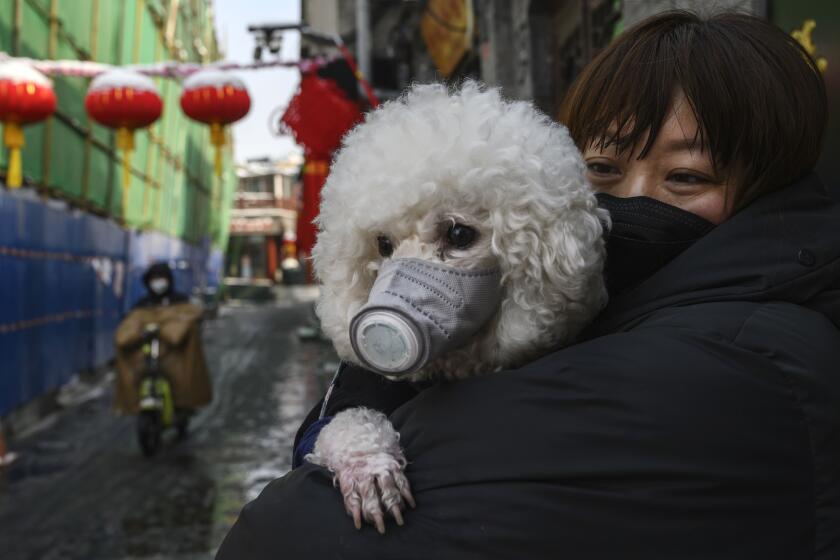After a tiger in New York contracted coronavirus, L.A. Zoo is taking extra precautions
- Share via
The Los Angeles Zoo announced increased safety measures for its employees and animals after a tiger in New York tested positive for the coronavirus over the weekend.
The Bronx Zoo tiger case is believed to be the first known instance of person-to-animal infection. Zoo officials in L.A. said Monday they don’t plan to test their animals as none have exhibited symptoms related to the virus. Outbreaks around the world are driven by person-to-person transmission, according to experts.
Instead employees taking care of cat species will now use personal protective equipment such as masks and gloves and are encouraged to practice social distancing. These security measures were already in place for primate, binturong and mustelid species, according to the L.A. Zoo.
“I think the difficulty with this is we don’t know how coronavirus would look like in every single species,” said Dominique Keller, chief veterinarian and director of animal health and wellness for the L.A. Zoo. “Not every animal or group of animals will exhibit the same signs.”
A dog in Hong Kong tested ‘weakly’ positive for the coronavirus that causes COVID-19 but may not have contracted it. What does this mean for pet owners?
The Bronx tiger developed a dry cough, an easy symptom to recognize, Keller said. As a result, zookeepers are on “heightened vigilance.”
“Our keeper staff know each and every animal they work with,” she said. “That’s their forte. Subtle changes are the first sign we see if there’s any kind of problem.”
Some animals — just like humans — need an extra boost of attention to maintain a healthy, routine schedule amid the growing coronavirus pandemic. The knobby flamingos, often in a hue of pink, fall into this category. During regular operating hours, visitors can mingle and feed these creatures nearly every day.
“It’s part of their week, and in effort to keep them comfortable and maintain status quo, we’re encouraging staff to come on by with masks and appropriate PPE to make there isn’t too much difference in their daily life,” Keller said.
Zoo officials in San Diego and Santa Barbara said similar safety precautions for animals and employees were implemented prior to the Bronx tiger case. They also do not have immediate plans to test their animals unless they show signs of illness.
“At this stage, the species we are most concerned about at our zoos are primates, felids, canids, mustelids (otters), herpestids (meerkats),” said Dr. Julie Barnes, Santa Barbara Zoo’s vice president of animal care and health in an email. Samples needed for testing would require anesthesia, she added.
The Bronx tiger case poses new questions about transmission of the virus in animals. The U.S. Department of Agriculture said there are no known cases of the virus in U.S. pets or livestock.
“There doesn’t appear to be, at this time, any evidence that suggests that the animals can spread the virus to people or that they can be a source of the infection in the United States,” Dr. Jane Rooney, a veterinarian and USDA official, said in an interview.
The USDA said Sunday it’s not recommending routine coronavirus testing of animals, in zoos or elsewhere, or of zoo employees. Still, Rooney said a small number of animals in the U.S. have been tested through the USDA’s National Veterinary Services Laboratories, and all those tests came back negative except Nadia’s, the 4-year-old Malayan tiger at the Bronx Zoo.
There have been reports of a small number of pets outside the United States becoming infected after close contact with contagious people, including a Hong Kong dog that tested positive for a low level of the pathogen in February and early March.
Hong Kong agriculture authorities concluded that pet dogs and cats couldn’t pass the virus to human beings but could test positive if exposed by their owners.
The Associated Press contributed to this report.
More to Read
Sign up for Essential California
The most important California stories and recommendations in your inbox every morning.
You may occasionally receive promotional content from the Los Angeles Times.












